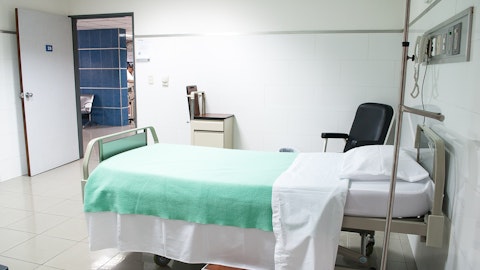Dane Andreeff: No changes. It’s a very active funnel with our e-commerce site with — partnered with UpScript. The folks are still coming in. There’s multiple ways patients interact with us. A lot of inquiries come right to Helius. And of course, then with that interest and those questions answered for the U.S. patients that are on label, they would be directed to the e-commerce platform. And remember, the e-commerce platform does a number of things for the patient. It reduces the patient’s time to get an appointment with their neurologists. That’s a really big factor these days post COVID, what we understand the average time to get an appointment with your neurologist is up to three months now, where having the telehealth, telemedicine site, e-prescribing site, we’re able to really allow the patient to get PoNS Therapy faster, quicker and start their treatment with their physical therapists.
Destiny Buch: Okay. Got it. Thank you. And a couple more for me, if that’s all right. Can you just remind me the timing on the TCET decision?
Dane Andreeff: So right now, we’ve got about 20 more days in the 60-day comment period. It’s fast and furious. I’ve been on probably two calls a week with lobbyists and also some of our congressmen and senators. It’s — with this comment period, this is where we’re really allowed to change the policy, which was written at CMS and hopefully towards our favor, the medical device companies. Right now, without TCET, on average, it takes — Scott Whitaker at AdvaMed said, it takes on average 5.7 years for a medical device company to get reimbursement through CMS.
Destiny Buch: Well, okay. Excellent.
Dane Andreeff: Yes, that’s a big number. Yes. So TCET is very important, not only for commercializing in MS and our reimbursement. But if you think about it, our second breakthrough in stroke, about 90% of stroke patients are covered by Medicare, by CMS.
Destiny Buch: Okay. All right. Got it. And then lastly, can you call out any scientific conferences you’ll be attending in the second half of ’23 and maybe the first half of 2024?
Dane Andreeff: Yes. We have one scheduled, but it’s on the neurological physical therapy side. We will not be presenting any data there, but we’ll be in the right place with neurologists and their neuro PTs.
Destiny Buch: Excellent. Thank you so much for taking our questions.
Dane Andreeff: Thank you, Destiny.
Operator: Thank you. Please standby for our next question. Our final question comes from Anthony Vendetti with Maxim Group. Please proceed.
Anthony Vendetti: Thanks. Hi, Dane and Jeff. Just in terms of – can you talk about the distribution agreement that you signed with HealthTech Connex? How is that going? Is that starting to bear fruit? Can you just talk about where that’s at, at this point? And then I have one follow-up.
Jeff Mathiesen: Sure. This is Jeff. I’ll take that question. So again, it was a — we had an agreement with them previously, and we ended up entering into a new agreement that replaced the previous one. And so the agreement provides them the exclusive distribution in Western Canada area. And that is something that is going well. We’ve got a good relationship with them. And so under the agreement, there are purchase requirements that they have to make from us. And they also do a lot in working with us in promoting PoNS. And as we’re trying to establish other programs and reimbursement in Canada, we also are working with them to get the insurance companies interested in reimbursing PoNS in Canada. So they’re a very strong partner and that agreement is progressing well.
Anthony Vendetti: Okay. Great. And then in terms of the e-commerce platform, how do you track — or do you track the traffic that you see there? Obviously, that helps you a lot in terms of reorders and so forth. Maybe just talk about what trends are you seeing on that platform?


